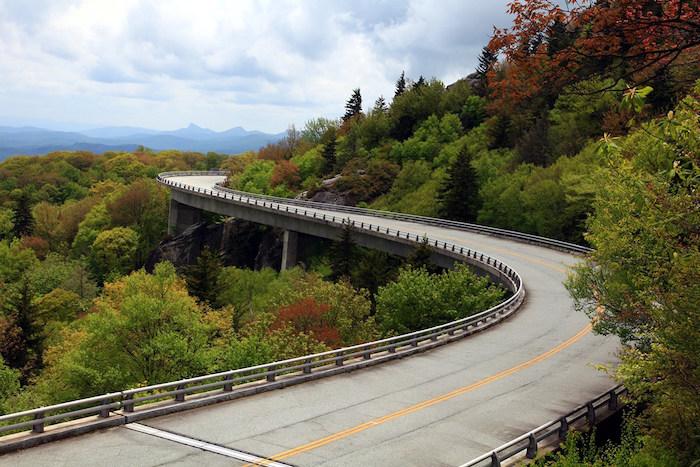
The Linn Cove Viaduct along the Blue Ridge Parkway will be closed for about three months, beginning March 1/NPS
An icon of the Blue Ridge Parkway, the Linn Cove Viaduct, is in need of resurfacing and bridge maintenance and will require closure to traffic for nearly three months beginning in March.
Parkway staff say the viaduct will be closed from March 1 through May 24 for the work. Also closed will be the trail below the bridge, which is closed at Milepost 304.
A traffic detour will be put in place from Milepost 298.6 (Holloway Mountain Rd) to Milepost 305.1 (US 221). Gates will be located at MP 303.6, Wilson Creek Overlook on the north and MP 305.1, US 221 on the south end of the work zone. Within the closed area, including the trail areas beneath the viaduct, the Parkway will be closed to all uses including motorists, cyclists, and pedestrians. The public’s cooperation with these closures will provide for the most efficient work schedule and will ensure the safety of staff and visitors.
During the closure, crews will remove and replace the asphalt pavement, waterproofing membrane and joints on the bridge. Repairs to the supporting structure, stone curb, railing and drainage features will also be made.
The Linn Cove Viaduct was completed in the mid-1980s, and is commonly known as the “missing link” that signaled the completion of the entire 469-mile Parkway route that binds together Shenandoah National Park in Virginia and Great Smoky Mountains National Park in North Carolina. The Linn Cove Viaduct is often celebrated as an engineering marvel with the road wrapping around the contours of Grandfather Mountain. It is 1,243 feet long, contains 153 segments weighing 50 tons each, and is supported by seven permanent piers.
The Blue Ridge Parkway inventory of paved roads includes bridges, tunnels, parking areas, spur roads, service roads, campground and picnic area roads, and the 469-mile Parkway motor route itself. Across the Parkway, many of these areas exceed recommended life cycles for pavement and are in need of repairs estimated to total over $300 million. Funding for road maintenance on the Parkway comes in large part from the Highway Trust Fund, which is derived from a federal fuel tax. The Blue Ridge Parkway annually identifies projects and competes for these funds to repair and maintain park roads.



Add comment